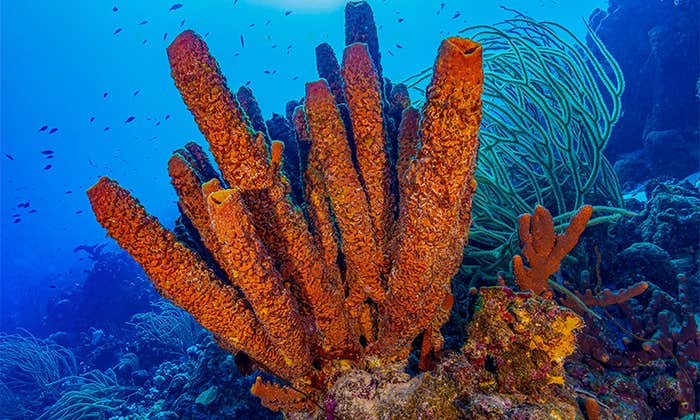There are many ways to think about alien, extraterrestrial life forms. Science-fiction writers do it all the time. Scientists, more interested in nonfiction, think about how to receive signals that real aliens might send, as well as what sort of signals we might send to “them.” SETI, the Search for Extra-Terrestrial Intelligence, is a real, ongoing project, with a real budget overseen by real researchers. Others partner with biochemists and evolutionary biologists to investigate how life might have begun on Earth and whether, and under what circumstances, it could also exist elsewhere in the universe.
But not many scientists have gone beyond to speculate on what alien life might actually, seriously, genuinely be like. One exception is Arik Kershenbaum, a zoologist at Cambridge University, whose recent book, The Zoologist’s Guide to the Galaxy, might remind readers of Douglas Adams’ The Hitchhiker’s Guide to the Galaxy. The Zoologist’s Guide, though, is definitely science and not fiction. Kershenbaum, a field researcher and evolutionist whose feet are firmly here on Earth, takes the novel perspective of assuming that aliens likely exist, and that if so, those of greatest interest (to him and to us) wouldn’t be simple micro-organisms but, rather, complex creatures of some sort. The guiding principle of The Zoologist’s Guide is precisely what one would expect from a well-trained zoologist: evolution by natural selection. That’s what got my attention.
As someone who has spent decades studying what evolution has produced here on Earth, but never allowed myself to ask what it might have wrought elsewhere, I was a bit skeptical at first of Kershenbaum’s thesis. But reading The Zoologist’s Guide, and then in conversation with Kershenbaum, I was increasingly won over—not only by Kershenbaum’s avid intellectuality (combined with his beguiling British accent), but also by the prospect of taking our hard-won knowledge of life and applying it to the widest possible horizons.

Could you explain how a highly regarded zoologist who studies animals here on Earth ended up writing a book about what animals on other worlds would probably be like?
I study animal communication, so I spend a lot of time thinking about what information might be in animal calls, why they’re making different kinds of calls, and what they mean. When you listen to animals communicating, it’s not immediately obvious how much information is in the sounds they make. If the sound itself is complex, it doesn’t mean there’s a lot of information in it. Much birdsong is very complex, but they’re probably only saying, “I’m a fit male.” Complexity in itself doesn’t necessarily reflect information content.
While I was thinking about the mathematics of this, and about how to get to this idea of information content, I was interfacing with people who were working in other fields, including, almost by coincidence, SETI people. They face similar problems, getting all kinds of radio signals from space, but not knowing which ones might be signs of intelligent life.
“Folks” is anyone who can build a radio telescope. “Critters” is everyone else.
It turns out that animal communication and human language both conform to certain statistical laws. We can look at particular animals and see to what extent they follow similar rules, which might give us some clue to what extent they are using complex information. This idea really appealed to me. If another species from another planet communicates complex information, would we recognize that as language? Would it follow the same rules?
It then occurred to me that this doesn’t just apply to communication. There are many rules about how animals behave, how they evolved, even how they look. And a lot of these rules have nothing to do with the particular circumstances here on Earth. They are just fundamental rules. So, although it started about what we can say about alien communication, my inquiry ended up being about whether we can say more than just that.
Astrophysicists assume the basic ground rules that apply on Earth work elsewhere in the universe: the speed of light, the mass of subatomic particles, strong forces, weak forces. And these assumptions have been strongly confirmed if you look at a star, another star, one galaxy, another galaxy. You make a comparable assumption about evolution by natural selection, which has been confirmed for every species we study, but unlike the fundamental rules of physics, organic evolution has only been observed here on Earth. So, what is your argument for the legitimacy of applying natural selection as a fundamental rule for life forms elsewhere?
The insight here is that if we were to observe complex life in the universe, we’re faced with a problem. How did that complexity arise? It’s important to remember that even the original, simplest life on Earth was incredibly complex. That complexity didn’t arise by chance. It couldn’t have simply popped into existence, so there must be a mechanism for the accumulation of complexity. Otherwise life cannot establish itself. And certainly, it cannot achieve the kinds of complexity that we’re postulating.
Then the question is, how many mechanisms are there for complexity to accumulate? It turns out that the only way, as far as we know at present, is for certain forms to persist and others to drop out, which is essentially evolution by natural selection.
Within science, there’s no postulated alternative. It’s not as if we’re thinking, “Well, it might be natural selection, or it might be Mechanism B.” Which would be fair enough, if Mechanism B had some sort of theoretical basis. But there isn’t any, other than evolution by natural selection. Of course, it’s an uncomfortable situation to be in, to say, “Well, I can’t think of anything else, so we’ll believe this.”
Science doesn’t generally overthrow the entirety of everything that’s been known beforehand. It tends to refine, and make things more accurate and more specific. It’s very rare for someone to say, “Everything we thought before is wrong. It’s actually this.” So organic evolution in other worlds is an assumption, but I think it’s well-grounded in what we know about how complexity can accumulate.
The other point to make is that if the right conditions exist, which is very likely because they’re very general—heritability and variation, and differential fitness—then natural selection will occur. So most likely, even if there is a Mechanism B, most planets will still have life that evolved through natural selection.
You write, “We have enough diversity of adaptations here on Earth to give us at least potential mechanisms that seem appropriate solutions, even on worlds almost unimaginably different from ours.” Want to elaborate?
It reflects something that people don’t often think about, which is that the number of solutions to the problems that animals face is actually quite limited. So by various rules, either physical or mathematical laws, life can’t do just anything. It’s highly constrained.
One example is flight. We know there aren’t that many different ways you can fly. There’s ballistic flight. You can jump like a cricket. Not particularly useful. You can use aerodynamic flight, with wings that generate lift through the flow of a fluid over an airfoil. These are things well understood by physicists and not specific to Earth. Or you can have buoyant flight, like a hot air balloon or a zeppelin. There are a few others, like jet propulsion, but the point is that these solutions are used over and over again. Buoyant flight is used by millions of species. All fish fly buoyantly. We often think of flight as going through air, but air is also a kind of fluid.
Other planets may have atmospheres of density and viscosity more similar to water than to air. So when you’re thinking of other worlds, you’ve got to change the parameters a little bit. But you’re still constrained by this restricted number of flight modalities. So to say that alien animals will have wings is not a radical suggestion. It’s just saying that somewhere, it is almost inevitable that creatures are making use of an airfoil to generate lift.
Natural selection relies on reproduction, specifically differential reproduction. So what would you speculate about the nature of reproduction when it comes to ETs?
Everyone wants to know about alien sex, right? If, as I believe, natural selection must have been acting, then reproduction must have been occurring. But exactly how, we’re a bit stumped.
The beauty is that natural selection is immune to any precise details of, say, biochemistry. You get natural selection even in artificial lifeforms. It doesn’t actually care what the biological basis is, so we can still speculate without knowing exactly what’s going on under the hood.
There isn’t any “Mechanism B,” there’s only evolution by natural selection.
Of course, a lot of what we understand about evolutionary mechanisms is based on particular modes of reproduction that occur on Earth, and there’s absolutely no reason that the way heritable information is passed here on Earth happens elsewhere.
But although we can’t say much about the details of alien reproduction, I think we can say that many of the processes will have parallels. And then of course there’s the big question of whether there would be anything like sexual reproduction. Is there some sort of shuffling of heritable information, which would be needed in order to accumulate complexity?
Many people love the cantina scene in the first Star Wars movie, watching what seems like the extraordinary diversity of these extraterrestrial creatures. And yet they all have heads of some sort, mouths, and light-perceiving organs. We can relate them in some ways to critters that we already know. Are such representations insufficiently imaginative on the part of the screenwriters, or maybe biologically realistic and the kind of thing that we might expect on Tatooine, or wherever complex animal life might exist?
I have a lot of respect for people who write really good science fiction, but we can’t forget that they’re under their own constraints, notably entertainment. We want to identity with these creatures, so they can’t be completely abstract. The cantina on Tatooine involves budgetary constraints as well, with people dressed up as aliens. But there is still something to be said for the idea that there will be common features to life that we would look at, and recognize, and say, “Oh. That’s a leg. That’s an arm.” Even if they have more, or fewer, or they’re a different shape or they’re made of different material, it’s the role that the appendage has. It’s the job that it does that’s important. Let’s not forget that they wouldn’t be able to fly their spaceship if they couldn’t pull the levers or press the buttons.
In your book, you reference one of my favorite science-fiction novels, The Black Cloud by astrophysicist Fred Hoyle. Hoyle imagined the possible existence of a life form that is completely novel by Earthly standards—an immense gaseous cloud with no particular shape, or much else except for an extraordinary hyper-intelligence. Is that kind of notion going too far by your biological standards? And how would you know?
It’s one thing to think of fantastic adaptations, but it’s easy to forget that those adaptations had to have evolved. Remember, we’re talking about the accumulation of complexity, about how a particular endpoint is reached through a series of steps. And it’s a dangerous game to think that some particular feature of an organism is so fantastically adaptive that it must have evolved, if you can’t see how it could have gotten there.
With The Black Cloud, it’s easy to say that having extreme intelligence is very useful. But has it evolved? Now we know why intelligence evolves on Earth, because animals are faced with difficult problems. They need to live, to survive, to eat, and to reproduce, And intelligence can be a huge adaptive advantage.
But it only evolves inasmuch as it gives such an advantage. Although a hyperintelligent cloud of gas would be a fantastic idea, I don’t see where the adaptive advantage has been along the way, what it evolved from. What was this less-intelligent cloud of gas? And why was it advantageous, floating in outer space, to be more intelligent?
Avoiding black holes?
Maybe. But why would such intelligence also allow complex communication with people on Earth?
Technological civilizations are short-lived. I don’t think we’re going to live very long.
What might we expect from an evolutionary perspective as to the intelligence of ETs?
Intelligence is a tough one. But one thing I think we can say is that any alien planet with complex life will have a range of different intelligences, according to the demands of their niche. We have some good ideas, but don’t really know a great deal about why even human-like intelligence evolved. It likely has a lot to do with navigating social relationships, remembering for reciprocity, and things like that. And then eventually for planning alliances. But in any case, it took 3.5 billion years to evolve technological intelligence, so it’s clearly not something that pops up every day, and we don’t know whether it might be more common or less on other planets. Although probably it’ll require some sort of ecological complexity.
But even then, would we expect a technological alien civilization to have arrived at its intelligence via the same route that it did in humans?
Laurance Doyle, a friend of mine at the SETI Institute, told me “There are two types of organisms in the universe: folks and critters.” Folks is anyone who can build a radio telescope, and critters is everyone else.
Apart from being a dig at people who aren’t physicists or engineers, there’s actually something a bit more subtle here, which is that there may be intelligent life all across the universe. But we’re not going to know about it unless it’s broadcasting radio waves to us, unless it reaches a particular kind of technological development.
Think of non-technological intelligences on Earth. And there are plenty. We can agree that dolphins are extremely intelligent. They probably have internal mental lives that are complex, rather like ours. But they don’t have technology, apart from sponging and things like that, and they never will. They don’t have a need for it, and it gives them no adaptive advantage. They do have great social intelligence, because they have very complex alliances, social behavior, and complex communication. But they’re never going to be technological. They don’t have hands.
So alien planets may be swarming with dolphins and other extremely intelligent creatures. But we’d never know, because they’re not enough like us to build a radio telescope, to send signals that we would pick up. In some ways we’re condemned to find life that’s like us.
Would that be your response to Enrico Fermi’s famous question? He asked, essentially, “Okay, there are presumably gazillions of habitable planets out there. But where are they?” Because they would have to have achieved a degree of technology in order to communicate in any sense with us?
There are a lot of answers to Fermi’s question. Maybe there’s just not much life—the rare Earth hypothesis. After all, there are so many coincidences that went into making it habitable. We needed a moon for tidal action, plate tectonics, magnetosphere, and these are just rare in the universe. Well, now we know that’s not true. There are billions of earthlike planets in the galaxy, so we’re OK on that point. Then all the other constraints in the Drake equation come into play. How long does a civilization live? I’d guess that is key. I think that once civilizations become technological, they become very short-lived. I don’t think we’re going to live very long. Or maybe there are billions of intelligent species out there but they’re just not sending radio waves.
Perhaps they’re keeping quiet precisely because they’re so smart they don’t want to run the risk of contacting us (or any others), and then being taken advantage of, possibly pillaged, colonized, killed? I’m thinking of the inverse of what Stephen Hawking worried about: that it would be prudent if we’d keep our heads down for just that reason, because who knows what’s out there?
No, I don’t agree, and for a few reasons. I find it hard to imagine an intelligent technological society that has reached the level where they’re able to travel between stars, and choose not to. I don’t know who’s doing all of this technological innovation on these planets, but I am guessing that it’s going to be scientists and engineers. And you know what scientists and engineers are like. They’re not going to put up with it.
Another slightly stronger argument is that a lot of this worry is an unfortunate side effect of 1950s science fiction, that the aliens are coming to colonize us just like the Communists, and we have to defend ourselves. We’re still living with that image, but I think it’s really unlikely. The strongest evidence against that is we don’t see the night sky swarming with alien spaceships. We don’t see signs of a galactic empire. I think it’s much more likely that when a civilization reaches a certain level of technological ability, they’ll have shed this 1950s human fear of domination by other civilizations.
Here’s a final, unfair, and silly question. In one of the Star Trek episodes—and it’s an enormous franchise with almost as many episodes, in one form or another, as there are other planets out there—there was a creature called a Gormagander. It looked like an enormous toad floating in interstellar space. Interestingly, it was an endangered species, and so the human starship had some treaty obligation regarding it. All we know is that it’s big, floating in outer space, and that it’s an endangered species. What would you hypothesize about Gormagander biology?
Organisms will radiate into niches where they have some sort of fitness advantage. So what’s this animal doing in space? No food.
Maybe it’s living on photons, or gravity waves.
But there are plenty of photons near stars, and not many in interstellar space, so it shouldn’t be out there far away from stars.
Maybe that bad choice is why it’s endangered!
It’s actually not a silly question because it reminds us to think that any organism will be adapted for a certain niche. What is it exploiting? Is there less competition for that something in interstellar space, or perhaps actually space itself is the resource. Or maybe it’s so big or demanding that it can’t exist on a planet. Not enough room. In which case, interstellar space might actually be quite appealing. I think it’s a good reminder of asking ourselves all the time, “OK, what niche is this animal filling up? What’s it doing there?”
David P. Barash is an evolutionary biologist and professor emeritus of psychology at the University of Washington. His most recent book is Threats: Intimidation and its Discontents.
Lead image: Andrea Izzotti / Shutterstock


























